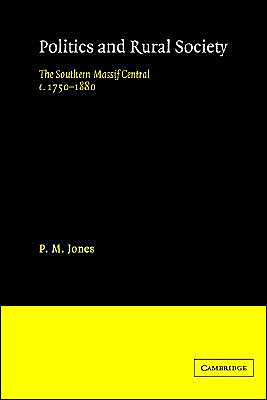

 |

|

The average rating for Politics in the Rural Society: The Southern Massif Central c.17501880 based on 2 reviews is 3.5 stars.
Review # 1 was written on 2014-07-15 00:00:00 Jacob Oxford Jacob OxfordRigorously researched and compelling overview of Sartre's involvement with politics and political thought. For those interested in the more theoretical/philosophical aspects of Sartrean political thought there is Thomas Flynn's Sartre and Marxist Existentialism as well as William McBride's Sartre's Political Theory, however this study in particular focuses more on Sartre's polemical and praxis oriented activities. We have an assessment Sartre's political engagements as whole rather than a specific treatment of his political writings, with emphasis on how Sartre engaged with both politics centered on the Soviet Union as well what the author terms "the anti-Stalinist left." Not being a Trotskyist myself the paradigm through which Birchall filters his research is sometimes annoying, yet for the most part does not prevent this from being a well conducted study(as of course every historical work is filtered through some ideology, I do not count the fact that the work is upfront about the ideology it espouses as necessarily a weakness). Sometimes it seems as though Birchall reduces debate on the left to Trotkyism vs. Stalinism(which leads to a particularly dismal and reductive assessment of The Critique of Dialectical Reason, as opposed to generally very apt discussion and contextualization of Sartre's literary and philosophical works), but this is the exception rather than the rule throughout the work as a whole. Ultimately Birchall has provided an overview and analysis which not only places Sartre in the concrete political contexts of his times, but also dispels the lazy dogmatic slander which liberals (and even a few marxists and anarchists, sadly) often employ against Sartre(such as the idea that he was a naive schill for the Soviet Union, or that he had a love for totalitarian leaders and terrorists which stemmed from his tendency to be malicious and hateful. One anarchist author in the midst of a screed against Che Guevara going as far as accusing Sartre of "having never met a leftist dictator or terrorist that he didn't like"). Sartre Against Stalinism presents us with an individual wandering through the world of political engagement in an often halting and sometimes confused way, yet always attempting to think and act in the service of the oppressed against the oppressors as well as in favour of the potential for human freedom to shape the world. |
Review # 2 was written on 2015-09-18 00:00:00 John Paul John Paul¿no fue la posterior suerte de Kruschev (destituido en 1964) una prueba de la ocurrencia de Oscar Wilde de que si uno dice la verdad, tarde o temprano se verá atrapado? El análisis de Sartre, no obstante, se queda corto en un punto fundamental: el informe de Kruschev sí tuvo un traumático impacto, incluso si «estaba hablando en nombre del sistema: la máquina estaba sana, pero su principal operador no lo estaba; este saboteador había aliviado al mundo de su presencia y todo iba a desarrollarse suavemente de nuevo» (Pág.166) Viviendo en el Final de los Tiempos Pág.408 |
CAN'T FIND WHAT YOU'RE LOOKING FOR? CLICK HERE!!!